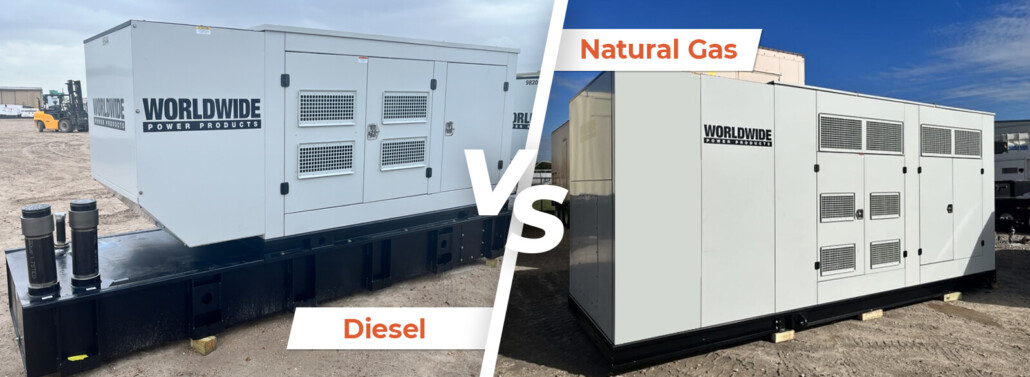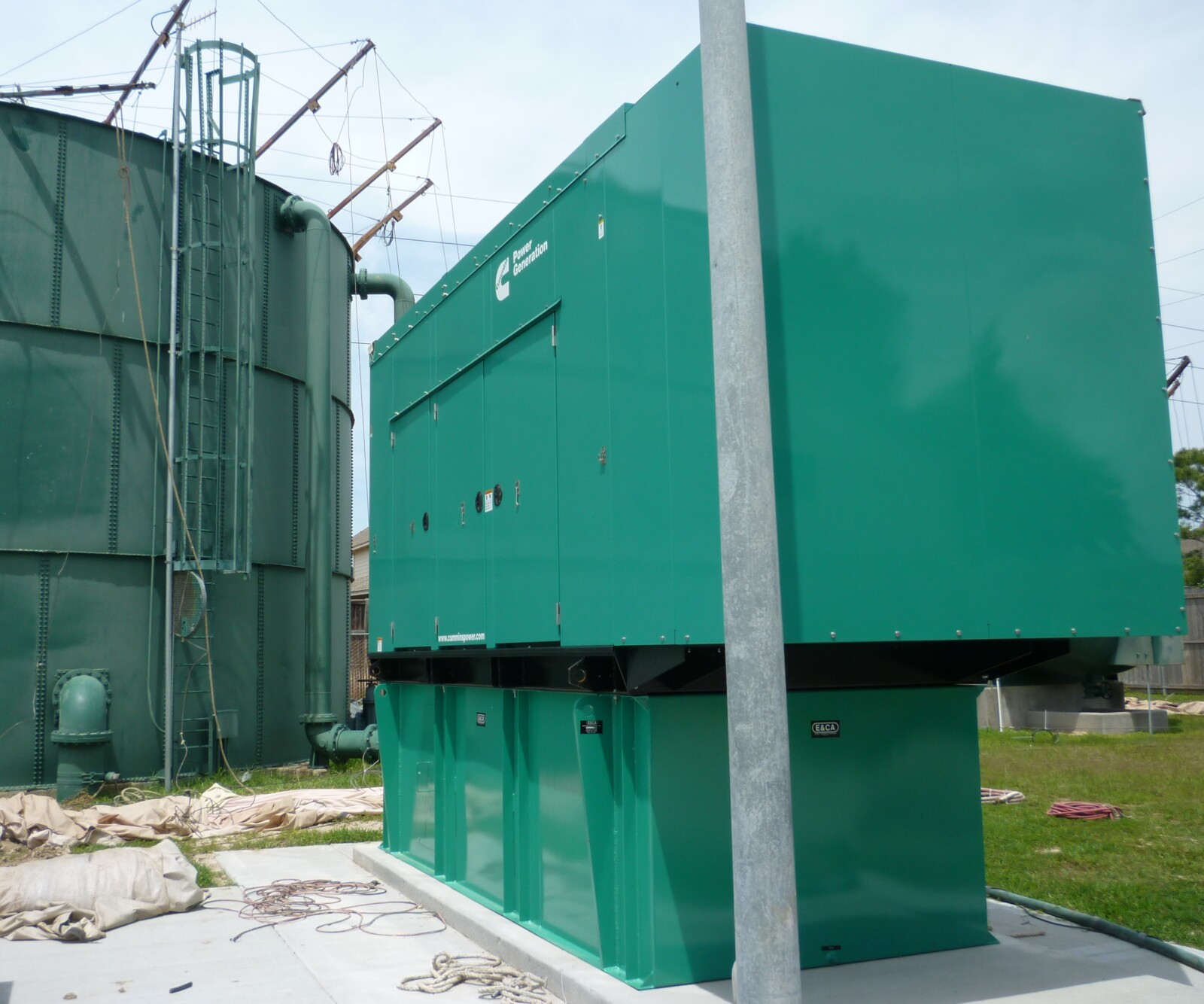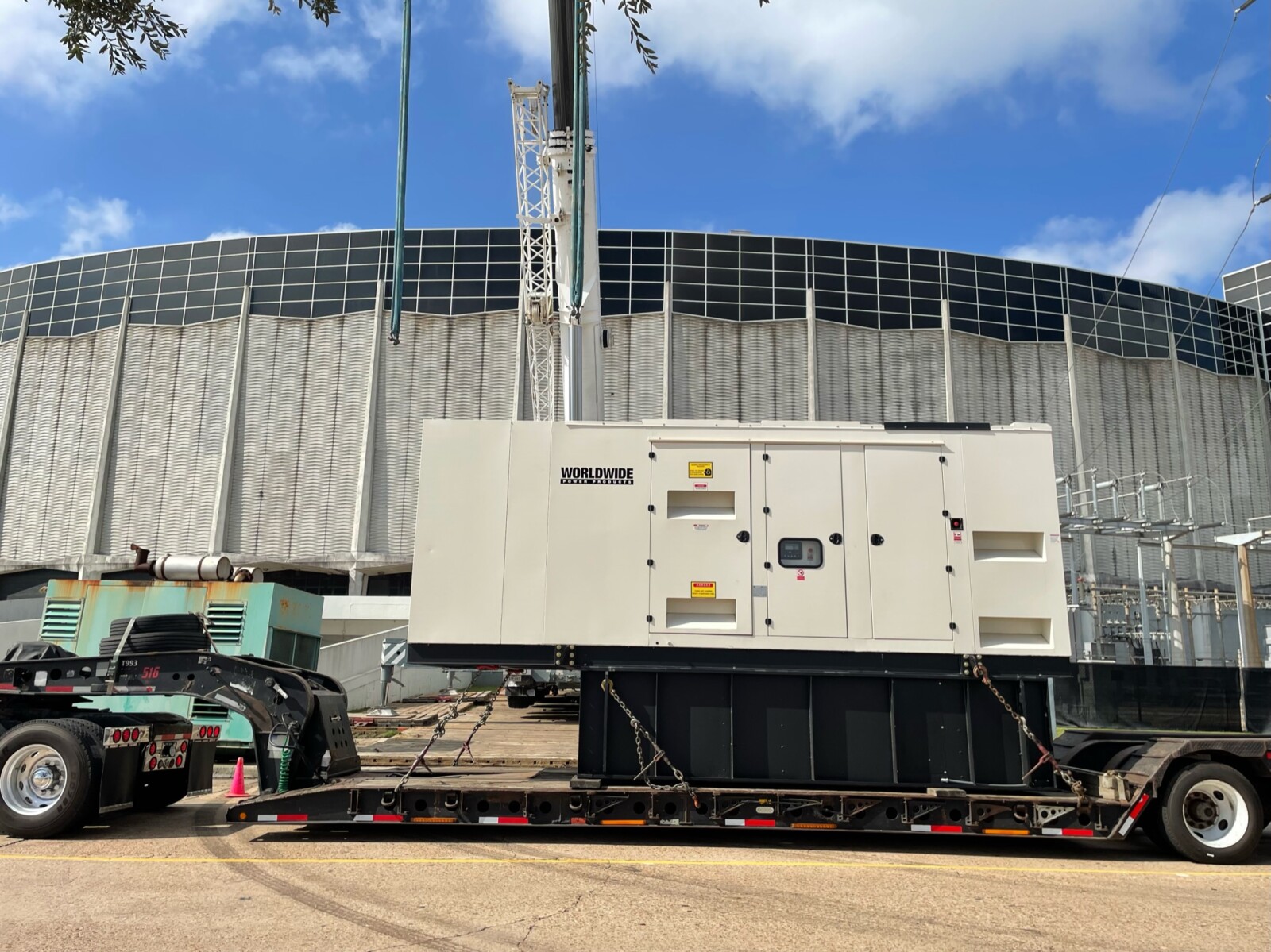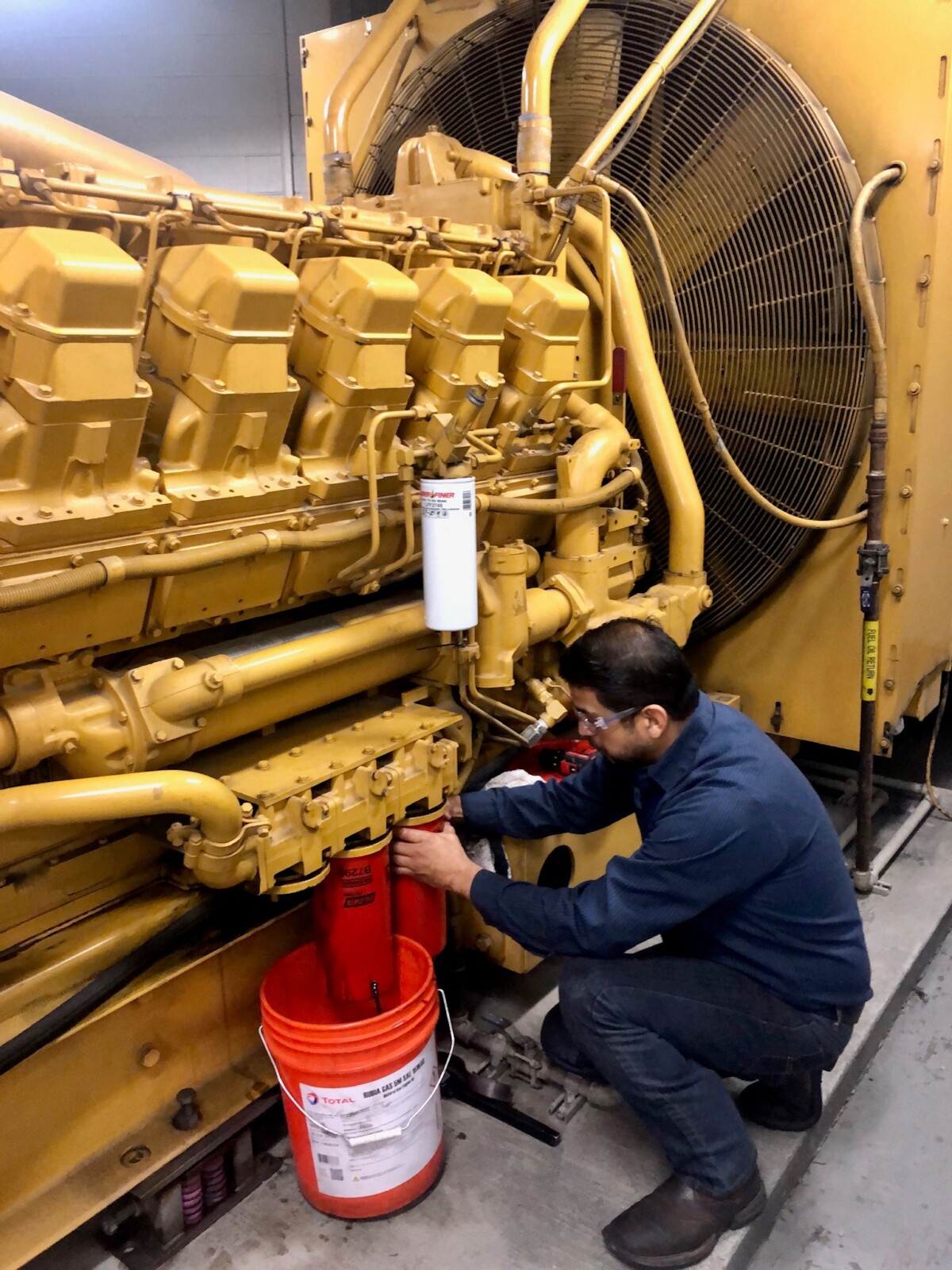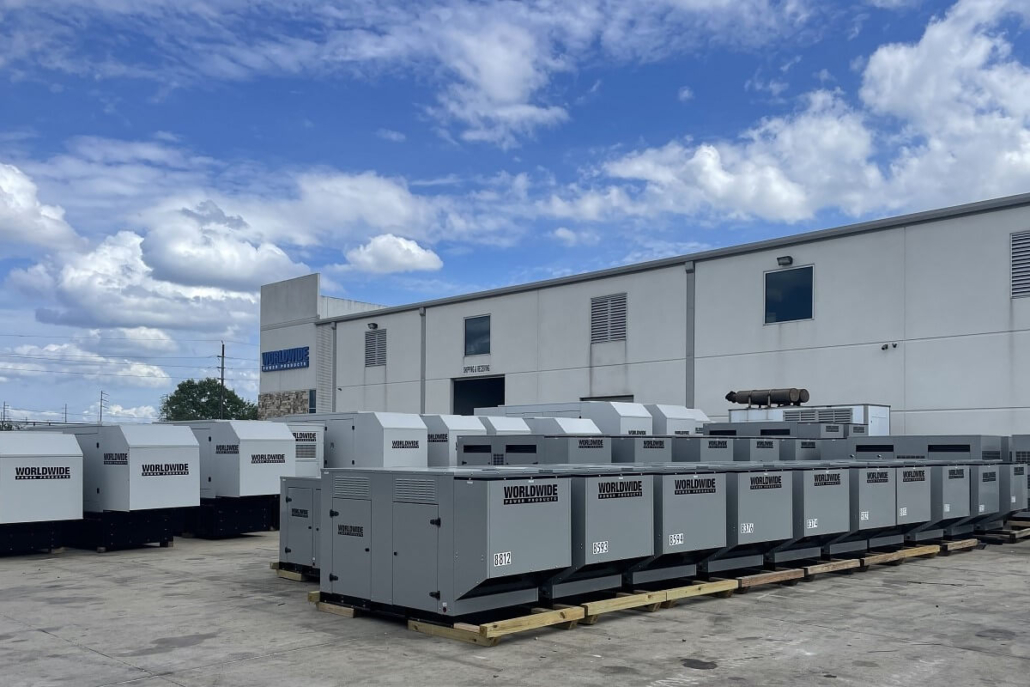Diesel vs. Natural Gas: Which Type of Industrial Generator Is Right For You?
Diesel and natural gas are the two most popular fuel types for industrial-class generators. There are pros and cons to each type, there’s no one-size-fits-all when evaluating which is the better option. Both offer reliable power in a more environmentally friendly way than ever before.
But let’s dig into the advantages and disadvantages of each kind of generator to help you decide which model could be the best fit for your operations…
Applications: Let Your Situation Dictate The Choice
Although diesel is often thought of as the go-to power supply for heavy equipment, both diesel and natural gas may be used as prime power or standby power. Diesel is more efficient at higher loads and can better handle sudden changes in load, but the cost of fuel may make natural gas the preferred option for your industry and business (more on this below).
Cost Preview: Minimal Difference in the Long Run
If the price of fuel were the only consideration, natural gas generators would automatically be cheaper than diesel models. Of course, this is not the only consideration; there are several factors that affect the cost of owning each kind of generator that require consideration.
We will dive into those other factors, then circle back to the question of cost at the end.
For now, suffice it to say that over the long run, the cost difference is negligible. As a 2019 report for the Department of Energy put it,
“Natural gas generators’ lower fuel costs per kilowatt-hour of energy generated allows [sic] grid-connected natural gas backup generators to economically produce more revenue than diesel generators. However, in all of the case studies examined for this report, lower capital costs make diesel generators more economic options than natural gas generators on a net present value (NPV) basis. The economic and reliability differences we find between diesel and natural gas generators are relatively modest.” [emphasis added]
Total Revenues or Savings ($/kW)
| State | Diesel | Natural Gas |
|---|---|---|
| Texas | $968 | $1,091 |
| Florida | $1,380 | $1,380 |
| New Jersey | $3,064 | $3,153 |
NPC of Backup Power per Unit ($/kW)
| State | Diesel | Natural Gas |
|---|---|---|
| Texas | -$425 | -$513 |
| Florida | -$175 | -$25 |
| New Jersey | $1,518 | $1,476 |
Efficiency: The Award Goes to Diesel
Because of the way diesel engines work, diesel generators are inherently more efficient than natural gas generators. Essentially, by using compression to ignite the fuel, more of the energy produced by a diesel generator’s combustion process is converted into useful work.
Diesel also has a much higher peak energy density than natural gas, roughly 129 Btu compared to 37 Btu, which means each unit of diesel packs more energy than a unit of natural gas.
Lifespan: Diesel Has the Edge
Assuming they’re both sized appropriately and maintained to manufacturer specifications, a diesel generator will last longer than a natural gas model. Because they’re built to handle large power demands, they’re typically liquid-cooled, rather than air-cooled, as smaller, portable generators usually are. Liquid cooling is more effective and reduces the wear on equipment and helps it last longer.
Industrial diesel generators also benefit from the fact that most run at 1800 RPM, rather than 3600 RPM, the speed at which lightweight/portable/residential generators typically run. The alternators in those smaller generators must spin twice as fast to make up for their lower amount of copper. The slower speed of an industrial diesel generator not only helps conserve fuel, it reduces wear on parts over the long term.
The Size Requirements
Natural gas generators typically have a larger footprint than diesel generators due to their power density and efficiency. For example:
- the 500kW natural gas-powered HIPOWER HNI-500 measures in at roughly 19 feet long, 8 feet wide, and 8.5 feet high, weighing 13,870 pounds;
- the 500kW diesel IGSA Volvo is roughly 17.5 feet long, 6.5 feet wide, and 7 feet high, weighing 12,652 pounds.
Both of the above example gensets come with sound-attenuating enclosures from the factory.
Fuel Storage and Supply
Speaking of sizing, diesel generators’ need for on-site fuel tanks can expand their footprint to a certain extent, depending on how much fuel storage is required. The most common type of tank is a sub-base tank–also called a belly tank–that is installed directly underneath the generator. Such tanks add as little as 8 inches to the height of the generator package, while others extend beyond the length of the package and can elevate the generator set a few feet higher.
The other type of tank is called a day tank, either above-ground or underground. These require more area than the space-saving belly tank, but they can store much more fuel: 10,000 gallons or more, compared to less than 1,000 gallons in a belly tank.
Natural gas generators are supplied directly by utility hookup, making them largely resilient to outages. They’re not reliant on delivery trucks like diesel, which can fail to arrive during disasters due to blocked roads. Still, because natural gas supplies can be interrupted under extreme circumstances, diesel generators with on-site storage are the most popular choice for critical applications such as hospitals.
Diesel fuel can be stored for roughly one year if treated with fuel stabilizer, otherwise it becomes unusable much faster. It also requires fuel polishing–having the contaminants removed and restoring necessary fuel additives–every one to four years. New diesel engines now require ULSD – “Ultra Low Sulfur Diesel”.
Natural gas is readily available on-demand in most urban areas, but often unavailable in remote ones. And in a true disaster in which natural gas infrastructure was jeopardized, a mobile diesel solution such as WPP’s Diesel Power Modules or a portable rental generator would be the best option.
| State | Diesel Reliability | Natural Gas Reliability |
|---|---|---|
| Texas | 97.3% | 98.3% |
| Florida | 90.1% | 95.5% |
| New Jersey | 97.2% | 98.2% |
| United States Average | 94.7% | 97.3% |
Maintenance
Despite the attention that needs to be paid to the fuel, diesel gensets generally require less maintenance overall. This is primarily due to the less complicated internals, e.g. the lack of a spark plug and carburetor. These parts in a natural gas generator need to be checked regularly.
In fact, both types require regular maintenance to keep them running smoothly, either by you as the owner or by a qualified technician. Filters, oil levels, belts, hoses, coolant levels, and batteries all need to be inspected and/or changed from annually to every two to three years. As you might guess, the more you run the generator and the higher loads you put on it, the more wear and tear you can expect to accumulate faster.
Emissions: Natural Gas Is Still Cleaner
Both types of engines generate emissions, but natural gas does so at a much lower pace than diesel. According to the Energy Information Administration, natural gas emits 116.65 pounds of CO2 per million Btus while diesel emits 163.45 PPM Btus. In fact, the EIA states that “burning natural gas for energy results in fewer emissions of nearly all types of air pollutants” than petroleum products such as diesel.
Nevertheless, diesel gensets have improved dramatically in the emissions department since the most recent Environmental Protection Agency (EPA) Clean Air Act standards took full effect in 2015. Off-highway diesel engines experienced the strictest EPA emissions requirements, which have reduced particulate matter (PM) and nitrous oxide (NOx) emissions by 99% compared to 1996 levels. And advancements are still emerging to make diesel even cleaner.
Note that in some states, such as Texas, mobile and/or emergency generators are not subject to Title V’s registration or fee requirements. As of September 1, 2023 the fee is $61.73/ton and is adjusted for inflation annually. This can affect your cost of ownership significantly, depending on how often you run your generator.
Safety: With Proper Precaution, There’s Minimal Risk with Both
Because their fuel is less flammable and they have no spark plugs, diesel generators are considered very safe to operate. However, their high wattage and voltage creates an electrical shock hazard and makes the use of insulated tools and personal protective equipment (PPE) important.
But generally speaking, the risk levels of industrial generators are on par with other types of heavy machinery, and both diesel and natural gas generators are safe to operate assuming regular maintenance is performed and all manufacturer safety instructions are followed.
Cost: Natural Gas Genset Likely More Expensive Upfront, but Makes Up for It Later
As mentioned above, the costs of owning a diesel generator are very similar to those associated with owning a natural gas model. We’ve outlined how diesel fuel consistently costs more than natural gas, but diesels are also more efficient. Natural gas lines must also be run to supply natural gas generators, which makes installation slightly more expensive than installing a diesel generator.
In a 2017 white paper, generator maker Generac found that the initial outlay for the two types of generators hinged on the size, with natural gas units priced “at or below” diesel units below 150kW, but costing 60-100% more over 150kW. Nevertheless, the impact of fuel prices alone over 20+ years can make even a high-kW natural gas generator a cost-effective option.
Alternative Options: Bi-Fuel and Dual-Fuel
As a way to deliver more flexibility, some manufacturers offer what they call bi-fuel and/or dual-fuel generators or generator accessories that can utilize both diesel and natural gas, or another fuel.
A dual-fuel system is capable of using two types of fuel at the same time in a mixture. It cranks up on diesel fuel, and a governor built into the system gradually adds until the optimal mixture of the two fuels is achieved for efficient running.
Like the bi-fuel system, a dual-fuel engine is usually capable of operating on just one of the fuel sources in the absence of the other. However, in many dual-fuel engines, a specific fuel is required to start the engine.
Summary: The Pros and Cons of Diesel and Natural Gas Generators
| Generator Fuel Source | Pros | Cons |
|---|---|---|
| Diesel | – More efficient – Less complicated maintenance – Longer lifespan – Usable in remote areas – On-site fuel storage offers ultimate grid insulation | – Costlier fuel – Fuel requires more attention – Elevated emissions – Louder operation |
| Natural Gas | – Less expensive fuel – Reliable, constant fuel supply – Quieter – Cleaner-burning – Widely usable in urban areas | – Higher up-front cost – Tougher maintenance – Larger footprint – Requires utility hookup |
Find the Generator You Need at Worldwide Power Products
We sell and rent both new and used diesel and natural gas generators, as well as all accessories and parts. We also design custom power solutions using the generator type that fits your application the best.
Contact us today to get help with your generator decision, or explore our online inventory.
